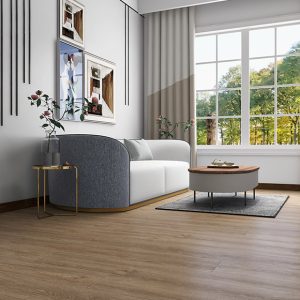When it comes to choosing to floor for your home, there are many options available. One option that has gained popularity in recent years is SPC (Stone Plastic Composite) flooring. SPC flooring offers many benefits, such as durability and waterproofness, but there are also factors to consider before making a decision. In this article, we will discuss the factors that homeowners should consider when choosing SPC flooring.

Durability and Lifespan
One of the main benefits of SPC flooring is its durability. SPC flooring is made with a combination of limestone, PVC, and stabilizers, which makes it resistant to scratches, dents, and other types of damage. However, not all SPC flooring is created equal. When choosing SPC flooring, homeowners should consider the thickness of the wear layer. The wear layer is the top layer of the flooring that protects it from scratches and other damage. The thicker the wear layer, the more durable the flooring will be. A thicker wear layer will also increase the lifespan of the flooring.
Waterproofness
Another benefit of SPC flooring is its waterproofness. SPC flooring is made with a waterproof core, which makes it a good option for areas of the home that are prone to moisture, such as bathrooms, kitchens, and basements. However, it is important to note that not all SPC flooring is completely waterproof. Homeowners should look for SPC flooring that has a waterproof core and is backed by a warranty that covers water damage.
Appearance and Style
SPC flooring is available in a variety of colors, patterns, and textures. Homeowners should consider their personal style and the overall design of their homes when choosing SPC flooring. Some SPC flooring options mimic the look of natural materials, such as hardwood or stone, while others have a more contemporary or modern look. Homeowners should also consider the size and layout of the room when choosing SPC flooring. A larger room may benefit from wider planks or larger tiles, while a smaller room may benefit from smaller tiles or planks.
Installation and Maintenance
The installation process for SPC flooring is relatively simple and can be done by a professional or a DIY homeowner. SPC flooring is designed to be installed as a floating floor, which means it is not attached to the subfloor. This makes installation quick and easy. Homeowners should also consider the maintenance requirements of SPC flooring. SPC flooring is easy to clean and maintain, but it is important to follow the manufacturer’s recommendations for cleaning and maintenance to ensure the longevity of the flooring.
Price and Value
The cost of SPC flooring varies depending on the quality of the flooring, the thickness of the wear layer, and the brand. Homeowners should consider their budget when choosing SPC flooring, but they should also consider the value of the flooring. SPC flooring offers long-lasting durability, waterproofness, and ease of maintenance, which can make it a good value over time.
Environmental Impact
Finally, homeowners should consider the environmental impact of SPC flooring. SPC flooring is made with PVC, which is a type of plastic that is not biodegradable. However, many manufacturers are taking steps to reduce the environmental impact of their products by using recycled materials and minimizing waste. Homeowners should look for SPC flooring that is made with recycled materials and has a low impact on the environment.

In conclusion, SPC flooring is a popular choice for homeowners due to its durability, waterproofness, and ease of maintenance. When choosing SPC flooring, homeowners should consider factors such as durability and lifespan, waterproofness, appearance and style, installation and maintenance, price and value, and environmental impact. By considering these factors, homeowners can choose the SPC flooring that best fits their needs and their home.

